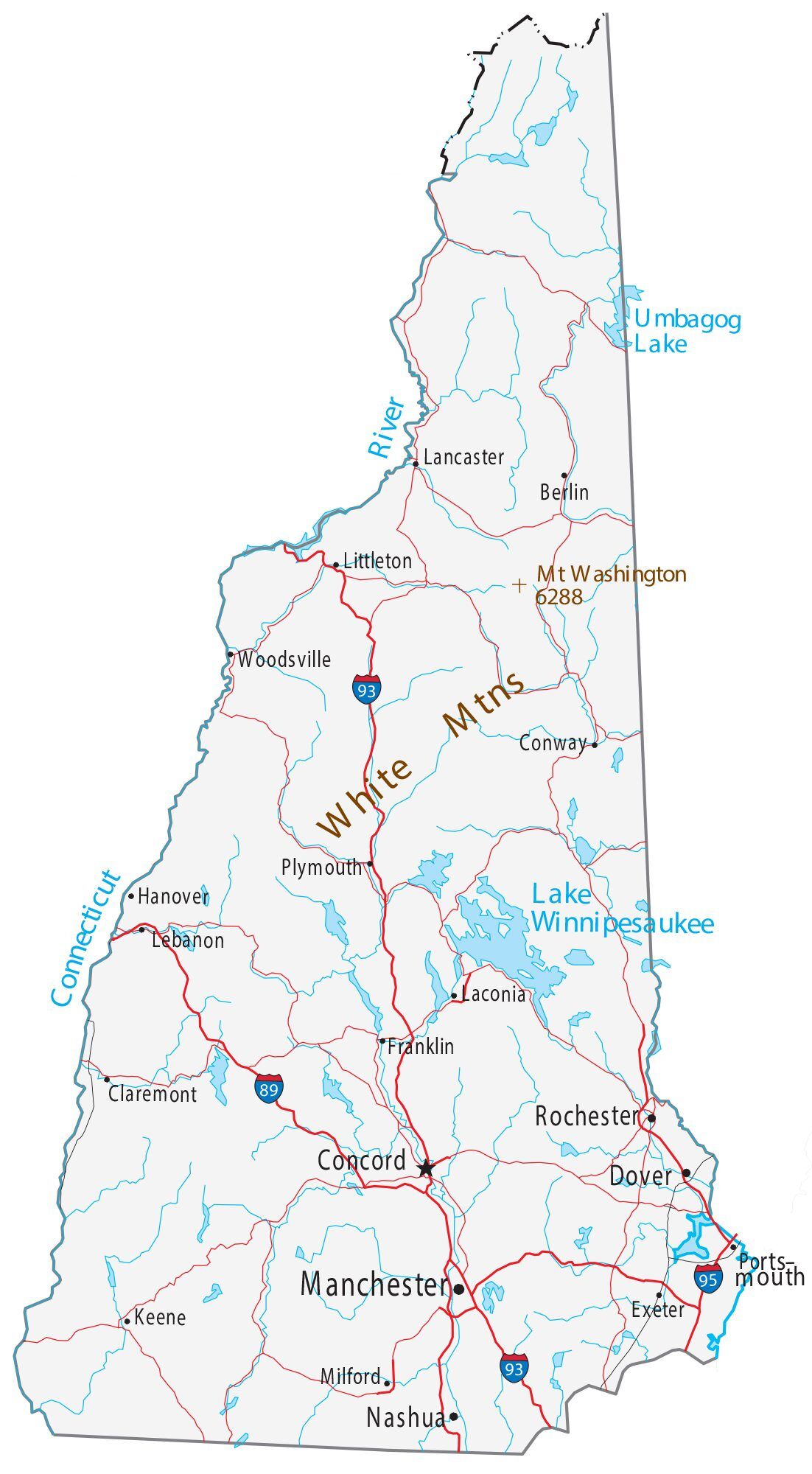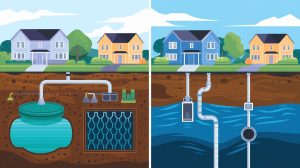Septic systems play a crucial role in maintaining wastewater management in New Hampshire. Whether you’re building a new home or maintaining an existing system, understanding the regulations and obtaining the proper New Hampshire septic license is essential. This article will cover everything you need to know about New Hampshire septic permits, wastewater disposal, maintenance schedules, and more. Let’s explore the requirements and guidelines to keep your system compliant and functional.
Table of Contents
- State-Specific Regulations Information
- Compliance Information
- Cost Information
- Local Resources & Contact Information
- Supportive Resources
- FAQs About Septic Systems in New Hampshire
State-Specific Regulations Information
Installation Permits
Installing a septic system in New Hampshire requires obtaining the necessary permits from local and state authorities. The New Hampshire health department guidelines play a significant role in this process. Homeowners and contractors must comply with New Hampshire wastewater management laws to secure the required permits.
Permit fees vary based on system size, complexity, and location. In most cases, obtaining a New Hampshire septic permit can cost anywhere from $500 to $2,000, depending on the scope of work and local requirements. Always check with the local health department to get an accurate estimate of permit costs for your specific project.
Septic Tank Size and Placement
The New Hampshire septic tank requirements specify guidelines for tank sizing based on the number of occupants and household wastewater usage. Typically, a residential septic tank should have a capacity of 1,000 to 1,500 gallons, depending on the household size.
Proper placement of the drain field is critical under New Hampshire sewage disposal standards. It must comply with a minimum distance from wells, property boundaries, and water sources to prevent contamination. The New Hampshire environmental quality standards dictate these placement requirements to ensure environmental protection.
Wastewater Disposal
Wastewater disposal in New Hampshire must adhere to strict New Hampshire wastewater laws and health department guidelines. Septic systems need to be designed in a way that prevents groundwater contamination. Wastewater disposal rules emphasize proper treatment and filtration before discharging into the environment.
The New Hampshire health department guidelines require homeowners to implement on-site sewage treatment systems (OSTS) that meet state-approved filtration and treatment standards. Regular compliance with New Hampshire wastewater management laws is necessary to protect public health and the environment.
Maintenance and Pumping
Regular maintenance and septic pumping are essential to ensure the longevity and functionality of your septic system. New Hampshire guidelines recommend that residential septic systems be pumped every 2 to 3 years. The frequency may vary depending on the household size and system usage.
Routine pumping prevents solids from building up in the tank, which can lead to system failure and costly repairs. Adhering to the New Hampshire septic tank requirements and maintaining proper system function is a responsibility outlined in New Hampshire environmental quality standards.
Regular inspections, septic inspection NH services, and adherence to the New Hampshire sewage disposal standards ensure a well-functioning and compliant system.
Compliance Information
Legal Compliance Guidelines
Compliance with New Hampshire septic permits and wastewater regulations is crucial. Homeowners must adhere to local and state guidelines outlined in New Hampshire wastewater management laws. A failure to meet these guidelines could result in fines or legal action.
The New Hampshire health department guidelines specify the installation and operational requirements for septic systems, including:
- Appropriate tank sizing
- Placement of drain fields
- Wastewater treatment standards
- Inspection protocols
These compliance measures are designed to protect both public health and the environment. Adherence to New Hampshire wastewater laws and regulations ensures that your septic system remains functional and compliant.
Potential Fines and Penalties
If regulations are not followed, homeowners may face significant consequences. Fines for non-compliance with New Hampshire wastewater laws range from $500 to $5,000, depending on the violation’s severity and impact on the environment.
Violations such as improper installation, failure to maintain the system, or non-adherence to New Hampshire sewage disposal standards could result in legal penalties. Additionally, violations could prompt environmental protection agencies to take corrective action under New Hampshire environmental quality standards. Adherence to these regulations safeguards both the property and community health.
Cost Information
Typical Costs for Services Related to Septic Maintenance and Installation
Permit Fees
Obtaining a New Hampshire septic permit typically costs between $500 and $2,000, depending on your project size and complexity. Fees vary depending on local jurisdiction requirements and the type of permit needed.
Pumping Costs
Septic pumping services in New Hampshire generally cost between $300 and $600 for residential systems. The cost may increase if additional services are needed, such as tank cleaning or inspections. Adhering to the New Hampshire health department guidelines helps avoid costly repairs caused by system blockages or buildup.
Installation Estimates
Installing a new septic system usually ranges from $5,000 to $15,000, depending on the tank size, system complexity, and property location. The costs include materials, labor, permits, and compliance with New Hampshire wastewater management laws and sewage disposal standards.
Working with certified septic service providers familiar with New Hampshire septic permits ensures proper compliance with installation and environmental requirements.
Local Resources & Contact Information
Official State Agencies
The New Hampshire Department of Environmental Services (DES) oversees septic system regulations and wastewater management. Homeowners can contact the department to obtain permits and clarify regulations.
New Hampshire Department of Environmental Services
- Address: 29 Hazen Drive, Concord, NH 03302
- Phone: (603) 271-3503
- Website: www.des.nh.gov
Local Health Departments
Each town and city in New Hampshire has its health department, which enforces local septic system guidelines. It’s crucial to contact your local health department to ensure compliance with all local and state-specific requirements.
Certified local septic service companies also offer inspections and compliance services. Reaching out to these professionals ensures your system adheres to the New Hampshire health department guidelines.
Supportive Resources
Government and Environmental Agencies Websites
- New Hampshire Department of Environmental Services: Comprehensive resources for septic regulations and compliance requirements.
- New Hampshire Health Department: Provides detailed guidelines and recommendations for septic system maintenance and wastewater disposal.
Guides and Downloadable Resources
Several handbooks and downloadable guides are available online, offering step-by-step instructions and checklists for maintaining compliance with New Hampshire septic regulations. These guides cover everything from tank sizing and drain field placement to wastewater disposal standards and environmental protection measures.
Conclusion
Understanding the New Hampshire septic license and its related requirements is essential for homeowners and contractors. Compliance with New Hampshire wastewater management laws, septic installation permits, and health department guidelines ensures system longevity and protects the environment. Adhering to septic pumping schedules, wastewater disposal standards, and local guidelines safeguards public health and prevents costly penalties.
By following New Hampshire’s environmental and sewage disposal standards, homeowners maintain a compliant and efficient system. Regular interactions with certified septic professionals and local health departments ensure a smooth and hassle-free septic system experience. Always prioritize compliance and maintenance to enjoy a long-lasting and environmentally responsible system that meets all New Hampshire septic regulations.
FAQs About Septic Systems in New Hampshire
Do I need a permit to install a septic system in New Hampshire?
Yes, in New Hampshire, obtaining a New Hampshire septic license or permit is required to install or modify a septic system. The Department of Environmental Services oversees this process to ensure compliance with New Hampshire wastewater management laws and health department guidelines. You can find detailed requirements and permit applications on the NHDES website.
What are the guidelines for septic tank size and drain field placement in New Hampshire?
Failing to follow the New Hampshire septic license regulations can result in significant penalties. Homeowners may face fines and legal consequences if they do not adhere to New Hampshire health department guidelines for system installation, wastewater disposal, and drain field placement. Compliance with New Hampshire wastewater management laws ensures public health and environmental protection.
Are there any wastewater disposal rules specific to New Hampshire?
Yes, New Hampshire has wastewater disposal standards outlined in the New Hampshire wastewater management laws. These regulations aim to minimize the risk of groundwater and surface water contamination. Disposing of wastewater must comply with the placement, treatment, and discharge guidelines set forth by the NHDES, ensuring that systems meet environmental protection standards.
What are the maintenance and pumping recommendations for a septic system in New Hampshire?
The recommended pumping schedule for a septic system in New Hampshire is typically every 3 to 5 years, depending on household size and usage. Regular maintenance includes checking for clogs, inspecting drain fields, and ensuring proper system operation. Adhering to New Hampshire Health Department guidelines ensures the longevity of your system while maintaining environmental quality.
What penalties do I face if I don’t comply with New Hampshire septic system regulations?
Failing to comply with New Hampshire septic system regulations can result in significant penalties. The NHDES enforces compliance through inspections and can issue fines or legal actions if guidelines are not met. Non-compliance might include improper system installation, failure to pump septic tanks on schedule, or inadequate wastewater disposal. These regulations are in place to protect groundwater and public health.
Where can I find certified septic service providers in New Hampshire?
In New Hampshire, certified septic service companies can be located through the New Hampshire Department of Environmental Services. Additionally, local environmental protection agencies and health departments often maintain lists of licensed septic professionals who comply with state-specific requirements. Contacting NHDES or visiting their website will provide accurate contact information and certification details. NHDES – Wastewater.}
How do I obtain a New Hampshire septic license, and what does it cost?
To obtain a New Hampshire septic license, you need to submit an application to your local health department or the New Hampshire Department of Environmental Services. The permit cost depends on factors like system size and location but typically ranges between $500 and $2,000. For complete details on obtaining a New Hampshire septic permit and related costs, visit the NHDES – Wastewater Management.
By following these guidelines and partnering with certified professionals, homeowners in New Hampshire can ensure their septic systems meet legal, environmental, and safety standards.
Directory | Washington Septic Service Providers | Part 1
DIY Repairs Are Always Cheaper
Septic Regulations in Rural Areas: Essential Guide for Rural Property Owners
The Role of Perforated Pipes in Drain Fields
What Happens During a Pumping Service?
Septic Tanks vs. Sewer Systems | Choosing the Right Option







